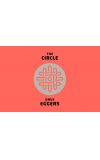
11 Oct 2013 03:59:46
In a recent essay published in these pages, Jonathan Franzen inveighed against what he sees as the glibness and superficiality of the new online culture. "With technoconsumerism," he wrote, "a humanist rhetoric of 'empowerment' and 'creativity' and 'freedom' and 'connection' and 'democracy' abets the frank monopolism of the techno-titans; the new infernal machine seems increasingly to obey nothing but its own developmental logic, and it's far more enslavingly addictive, and far more pandering to people's worst impulses, than newspapers ever were." I cite this because it chimes with the points that Dave Eggers is making in his latest novel, The Circle; we are at an interesting moment when two such significant figures of American letters have both independently been so moved to expound on the same subject. But my guess is that Eggers won't suffer the same online crucifixion that has subsequently been Franzen's fate. Why? Because although Eggers is saying all the same things as Franzen (and so much more), he makes his case not through the often tetchy medium of the essay, but in the glorious, ever resilient and ever engaging form of the novel.
The Circle is a deft modern synthesis of Swiftian wit with Orwellian prognostication. That is not to say the writing is without formal weaknesses – Eggers misses notes like an enthusiastic jazz pianist, whereas Franzen is all conservatoire meticulousness – but rather to suggest that The Circle is a work so germane to our times that it may well come to be considered as the most on-the-money satirical commentary on the early internet age.
This is the story of Mae Holland, a woman in her early 20s, who secures a job at the vast techno-sexy social media company, the Circle, an approximate combination of Facebook, Google, Twitter, PayPal and every other big online conglomerate to whom we have so far trusted our lives. Run by the "Three Wise Men", the Circle recruits "hundreds of gifted young minds" every week and has been voted "most admired company four years running". Among their inventions is "TruYou", a single integrated user interface that executes and streamlines every internet interaction and purchase: "One button for the rest of your life online." Their philosophy is total transparency and their campus is an architectural essay in glass, a temple to all the geek-chic entertainment and amenities that limitless profits can buy.
Mae is absurdly grateful for the opportunity to work in this brave new world. The novel tracks her own integration into the ethos and activities of the Circle, gradually illuminating a deeply disconcerting vision of how real life might soon be chased into hiding by the tyranny of total techno-intrusion. Mae, herself, ends up suggesting that an account with The Circle should be made mandatory by the government, this being the most effective way to increase vote turnouts.
There is much to admire. The pages are full of clever, plausible, unnerving ideas that I suspect are being developed right now. "SeeChange" is one such: millions of cheap, lollipop-sized "everything-proof" high-resolution cameras with a two-year battery life that can be taped up anywhere so that the video streams can be accessed by all. "This is the ultimate transparency. No filter. See everything. Always." Meanwhile, there are some fine moments of description – Eggers portrays the mysterious Kalden as a man whose "skinny jeans and tight long-sleeve jersey gave his silhouette the quick thick-thin brushstrokes of calligraphy".
The book is also very funny. Dan, Mae's boss, is described as "unshakeably sincere"; he nods "emphatically, as if his mouth had just uttered something his ears found quite profound". One of my favourite passages describes Mae's frenzy as she attempts to raise her "PartiRank", her relative Circle social-participation score, calculated as the result of her digital interactions. After work, therefore, she sits for hours in front of her myriad screens and posts in 11 discussion groups, joins 67 more feeds, replies to 70 messages, RSVPs to dozens of events, signs petitions and provides widespread "constructive criticism" before realising that, in order to make real headway up the ranks, she had better stay up all night and manically comment, smile, zing, join, frown, befriend, invite …
Mae has a boyfriend from her past, Mercer, her main antagonist. Mercer spends hours thinking of ways to "unsubscribe to mailing lists without hurting anyone's feelings". He finds that the digital bingeing of the world leaves him "hollow and diminished", and that there is "this new neediness [that] pervades everything". Indeed, it is Mercer with whom Franzen might best get along; Mercer feels that he has "entered … some mirror world where the dorkiest shit is completely dominant", that "the world has dorkified itself". And it is Mercer's fate – when Mae tracks him down in hiding using Circle technology – that furnishes the novel with its most kinetic passage of satire.
There are a few weaknesses. Eggers struggles here and there to balance psychological plausibility with the outlandishness of his satirical flourishes; he sometimes needs his characters to behave in ways that seem – certainly when you put the book down – to be wholly implausible. There is also a clumsy metaphorical scene where a shark eats all the other fish in the aquarium tank. But this is a prescient, important and enjoyable book, and what I love most about The Circle is that it is telling us so much about the impact of the computer age on human beings in the only form that can do so with the requisite wit, interiority and profundity: the novel.

